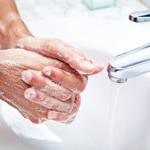Best Way to Wash Your Hands?
What’s the proper way to wash your hands? Is it best to use soap and water or antibacterial gels or soaps? How long should you wash to make sure your hands are clean?
Andrew Weil, M.D. | October 11, 2012

Washing your hands is one of the best and most cost-effective ways to prevent the spread of infection. Although you’re never going to get rid of all the germs you pick up as you go through the day, hand washing can help eliminate a lot of them. The U.S. Centers for Disease Control and Prevention (CDC) thinks the subject is so important that it created a special website devoted to proper hand washing. Many people – especially children – are careless about washing their hands, but the rules your mother probably taught you still apply and are endorsed by the CDC: be sure to wash your hands before you pick up anything to eat; before, during and after preparing food; after using the toilet, changing a baby’s diaper, or cleaning up a child who has used the toilet; after you blow your nose or sneeze; and after touching garbage. In addition, be sure to wash your hands before and after caring for someone who is sick and after touching animal food or waste.
Wash with soap and water. Work up a lather and scrub well; always clean the backs of your hands, between your fingers and under your nails. Doing this right takes at least 20 seconds – CDC advises that humming "Happy Birthday" twice will help you gauge the right amount of time. Then, rinse well and dry your hands on a clean towel or under an air dryer.
I’ve never thought that antibacterial soaps and gels were necessary for home use, and I don’t use them myself. Obviously, they’re needed in nursing homes, hospitals, and other healthcare settings where there is a high risk of spreading infection from person to person. But there’s no proof that the antibacterial soaps and washes marketed for home use serve any useful purpose. In fact, they are likely to be counterproductive by accelerating the development of resistance to antibiotics.
The CDC agrees with me on this issue. If soap and water aren’t available, the agency recommends using an alcohol-based hand sanitizer containing at least 60 percent alcohol but notes that while these products can quickly reduce the number of germs on your hands, they don’t eliminate all types. The CDC also makes the point that hand sanitizers aren’t effective when hands are visibly dirty.
Here’s where you can read more about my views on antibacterial soaps and here’s what you should know about the dangers that antibacterial products can pose.
Andrew Weil, M.D.









